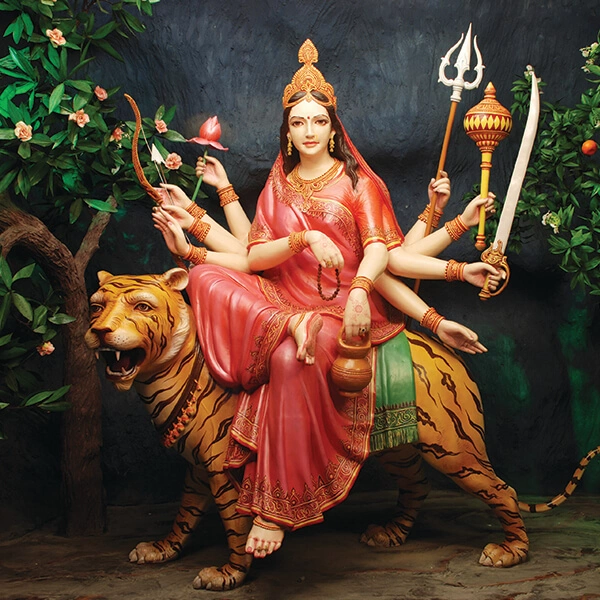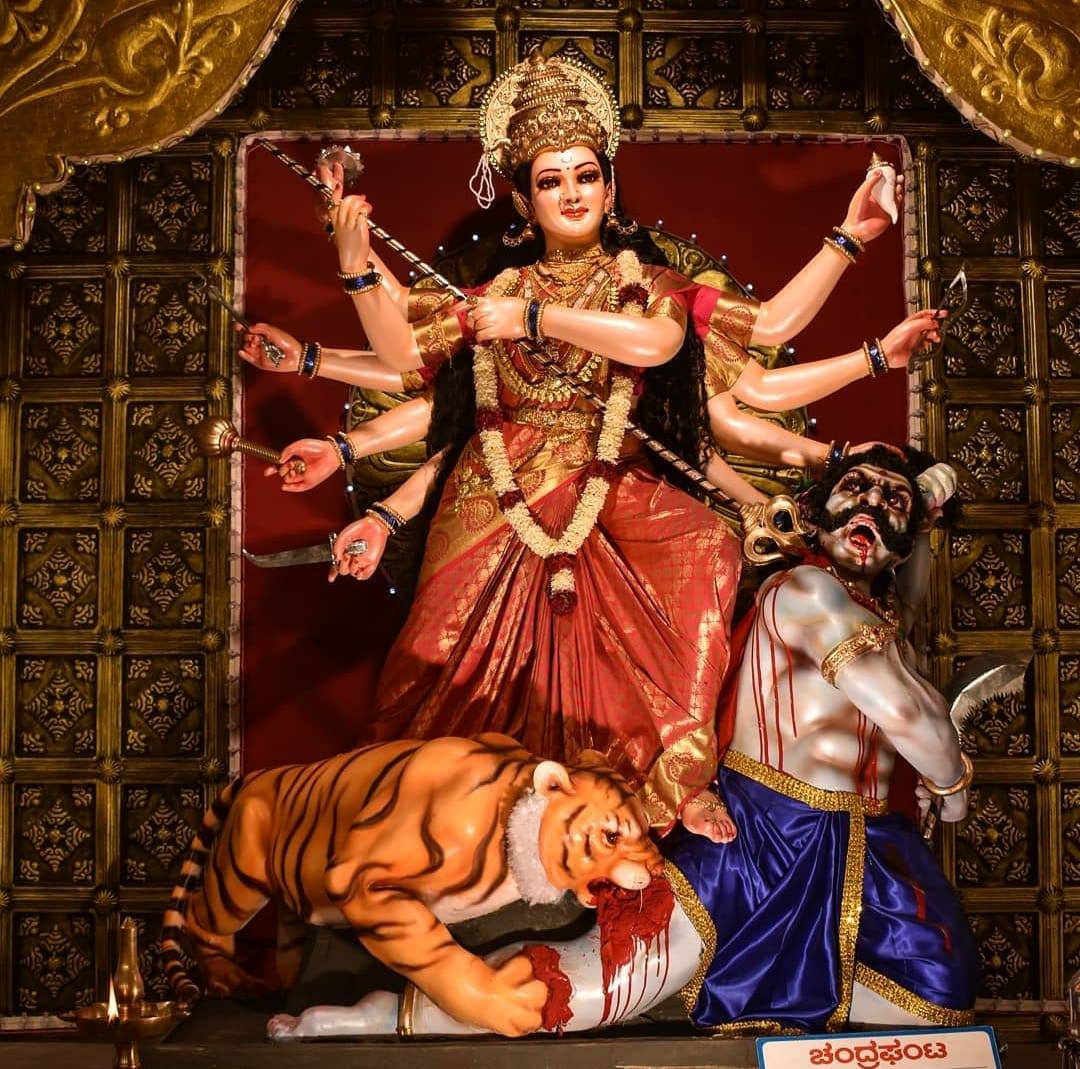
#Happy #Navratri Day 3
Tritiya
#Maa #Chandraghanta Puja
24th
March 2023
(Friday)
Chandraghanta #Mata is worshipped on the third day of Navratri. Her name means: ‘ #Chandra’ - the #Moon, ‘Ghanta’ - hanging like bell. When #Goddess #Parvati adorned her forehead with the crescent Moon, she got this name. She is also known as Chandrakhanda. This form of Goddess gives courage and valor to the worshippers. She also takes away the problems related to the paranormal as well. Goddess Chandraghanta is the fierce form Parvati. But, her angry form can only be seen if she is provoked; otherwise, she is quite calm.
About Chandraghanta
Maa Chandraghanta rides on a tigress and has a golden skin tone. She has 10 arms. The 4 left arms carry Trishul (trident), Gada (mace), Sword, and Kamandal (stoup); the fifth arm remains in the Varada Mudra. Her 4 right arms carry lotus, arrow, bow (Dhanush), and Japa Mala (rosary); the fifth arm stays in Abhaya Mudra. In this form, she appears all set for a war.
Legend
When Lord Shiva told her finally that he will not marry anyone, she started suffering badly. He could not resist her pain and eventually they had quite an emotional reunion. After that, he visited King Himavana along with his Barat (the procession of family and friends along with the groom to be married). His Baaraat included all creatures including goblins, ghosts, gods, ascetics, Shivaganas, Aghoris, and many more.
The procession scared Pravati’s mother, Mena Devi and she got fainted in terror. In order to settle down all her family members, she took the form of Chandraghanta and arrived in front of Shiva. After that, in a very polite manner, she requested Shiva to look like a princely groom. Shiva agreed and came in a mesmerizing form, just like a prince. Also, he adorned himself with all those precious jewels that actually enchanted Parvati’s family.
Astrological Aspect
Chandraghanta Maa governs the planet Venus in astrology. Worshiping her can eliminate all the ill effects of Venus.
Mantras
ॐ देवी चन्द्रघण्टायै नमः॥
Prarthana Mantra:
पिण्डज प्रवरारूढा चण्डकोपास्त्रकैर्युता।
प्रसादं तनुते मह्यम् चन्द्रघण्टेति विश्रुता॥
Stuti:
या देवी सर्वभूतेषु माँ चन्द्रघण्टा रूपेण संस्थिता।
नमस्तस्यै नमस्तस्यै नमस्तस्यै नमो नमः॥
Dhyana Mantra:
वन्दे वाञ्छितलाभाय चन्द्रार्धकृतशेखराम्।
सिंहारूढा चन्द्रघण्टा यशस्विनीम्॥
मणिपुर स्थिताम् तृतीय दुर्गा त्रिनेत्राम्।
खङ्ग, गदा, त्रिशूल, चापशर, पद्म कमण्डलु माला वराभीतकराम्॥
पटाम्बर परिधानां मृदुहास्या नानालङ्कार भूषिताम्।
मञ्जीर, हार, केयूर, किङ्किणि, रत्नकुण्डल मण्डिताम॥
प्रफुल्ल वन्दना बिबाधारा कान्त कपोलाम् तुगम् कुचाम्।
कमनीयां लावण्यां क्षीणकटि नितम्बनीम्॥
Stotra:
आपदुध्दारिणी त्वंहि आद्या शक्तिः शुभपराम्।
अणिमादि सिद्धिदात्री चन्द्रघण्टे प्रणमाम्यहम्॥
चन्द्रमुखी इष्ट दात्री इष्टम् मन्त्र स्वरूपिणीम्।
धनदात्री, आनन्ददात्री चन्द्रघण्टे प्रणमाम्यहम्॥
नानारूपधारिणी इच्छामयी ऐश्वर्यदायिनीम्।
सौभाग्यारोग्यदायिनी चन्द्रघण्टे प्रणमाम्यहम्॥
Kavacha Mantra:
रहस्यम् शृणु वक्ष्यामि शैवेशी कमलानने।
श्री चन्द्रघण्टास्य कवचम् सर्वसिद्धिदायकम्॥
बिना न्यासम् बिना विनियोगम् बिना शापोध्दा बिना होमम्।
स्नानम् शौचादि नास्ति श्रद्धामात्रेण सिद्धिदाम॥
कुशिष्याम् कुटिलाय वञ्चकाय निन्दकाय च।
न दातव्यम् न दातव्यम् न दातव्यम् कदाचितम्॥
With this, we hope that you will make the best of Navratri’s third day. May Chandraghanta Durga blesses you with all the goodness of life.
Happy Navratri!
Radiancy of the Foe-Destroying Splendorous Moon

The Third Night of #NavRatri is dedicated to Ma as Chandraghanta – which we might directly translate as ‘Moon Bell’, although this does not quite capture the true sense of the latter term’s meaning.
Now a Ghanta, for us, is a bell. Particularly of the sort rung during religious purposes. The sense is not merely an inanimate object of heavy metal – but rather, it is the sonorous quality that radiates out therefrom. And what it brings with it.
These are feelings of piety, these are feelings of reassurance – and to those who would endeavour to stand against the Gods … these are feelings of terror.
Ghanta, in Sanskrit, does not only refer to a Bell – its meaning-field also incorporates a quality of being ‘Shining’, ‘Radiant’, ‘Splendour’.
As we have often explored, there is a most intriguing coterminity between ‘Sound’ and ‘Light’ in various Indo-European languages – this further expresses that. (And we are further reminded of Her command over speech, too)
Both Sound and Shining Splendour, after all, radiate out from their source to reach us. And both Sound and Light can ‘illuminate’ concepts – impart them to us, clarify and clear our minds of doubt and darkened obscurity.
In this sense, ‘Chandra-Ghanta’ is a most eloquent phrasing indeed. For within the course of the Mythic Cycle of the NavaDurgas, Her appearance coincides with just such an occurrence.
At the conclusion of the previous Night’s NavaDurga Aspect’s saliency within the story – that of Brahmacharini – Devi had managed to not only meet Her Destiny, Mahadev, but also convince Him that She was, indeed, His Wife (or, at least, would soon be – as She was His ‘Other Half’, and had been before). As Shiva is ‘Chandra’, we might suggest Her to be His ‘Ghanta’ – certainly, Shiva’s epithet as ‘GhantaPriya’, the One to Whom the Bell is Dear, springs to mind.
They then, Together, proceed back down the Mountains, in order to make for Her Father’s palace. There to conduct things formally and have the marriage done – in a word – ‘Rite’.
Except there is a bit of a problem … Lord Shiva comes with His Retinues. The fearsomely formidable Ganas. Who present, much as They are. Ghosts, Rakshasas, Drug-Addicts, Criminals, Figures that look a bit ‘Insane’, Barbarians, you get the idea. It is a rather terrifying sight. And, within that context, Lord Shiva looks much like these assembled coteries.
Which is one thing in ordinary times and to ordinary men – but an even further disconcerting prospect when the male in question looks to wish to marry your beloved daughter.
Upon beholding the site of the (Bhole Ki) Baraat [‘armed wedding processional’] of Shiva, Queen Menavati – the mother of Parvati this time around and wife of King Himavat (Her Father) – faints in terror. One can only imagine what the Lord of Himalaya thought upon this – surely it should have appeared as if a marauding war-host had come to lay waste to his palace and domain.
Except at this point, Devi takes action – and assumes the ChandraGhanta Aspect. The One that we are dedicated to upon this night.
Via the Light of the Moon, the scene is shown to be as it actually is – and not as it had at first appeared to be to the unfamiliar eyes of Her family.
The terrific host of demonic and dancing crazed figures of baleful disposition or barbarous visage are, in fact, revealed to be the trusted retainers of Rudra, here as a traditional and expected customary part of the Marriage Ritual.
The trepidation of impending harm gives way to the joy of impending reunification. The illusions, the preconceptions, the barriers to what’s fact – are dispelled via the glinting light of the Moon.
This is the Light which shines most brightly in the Dark – it’s the radiant splendour of ‘Chandra’, indeed. And it fights back against the anti-divine [‘A’Suric’ we would say – Opposed to the Gods, Anti-Sura] in a slightly different fashion to the ‘Ultra-Violent Light’ that we see in some of the ‘Daylight’ Warrior Aspects of Devi. Whereas They burn away what is impure and oppositional, the ChandraGhanta saliency is rather to simply show what is actually there. Darkness is ‘transcended’ via illumination – illusion is dispelled not necessarily via destruction, but rather through clarity. The necessary provision of light – at Night, when things are darkest and scariest and we do, in fact, need it the most. Directly into the mind, even, it would seem.
Now having said that, it is quite readily apparent looking at this beautiful Murti of Her [from Mangalore, where this style of depiction is a regular feature] is engaged in some rather more active (and actively violent) demon-slaying. This is as it should be.
Devi Durga’s most celebrated mythic combat is that against Mahishasur. Mahishasur, as it should happen, is known to be something of a master illusionist – in part why he changes form during the course of the combat, as well. And why he is unable to escape from Her through so doing. Because She is not fooled by his guises, and is quite capable of grasping hold of the slippery spirit at his core and (meta)physically beating him into submission and obliteration no matter what form he might choose to cover himself with.
This, then, is the dual-truth of ChandraGhanta’s action.
To reveal what is actually there – and so to make some dangers, some obstacles simply melt away for they were figures of the mind rather than fact.
Yet also to reveal what is actually there – and so to show the real dangers, so they may be more effectively combatted through quite direct means; rendered to dissolve away in another sense – precisely because they were not simply misperceptions.
The one often avails the other, and as we have seen viz. Mahishasur – demons often have a noted potency with illusions and false fronts, the better to ensnare the unwary and disguise their true motions with. They can even make a great friend or a husband seem to be something entirely other than what they (or even They) truly are. If we let them.
We have written at far grander length and expository detail upon Chandraghanta in our previous years’ tribute-piece to Her, which can be found here –
https://aryaakasha.com/2019/10/02/chandraghanta-third-of-the-navadurgas-the-third-night-of-navratri-2/
But I hope that this shall (un)cover us clear enough for now. And help to praise the Moonlight such that the illusory barriers of a mythically salient nature are, themselves, dissolved – revealing the pathway via moonlight back to the pious, wolflike truth.
ॐ देवी चन्द्रघण्टायै नमः॥
जय माता दी